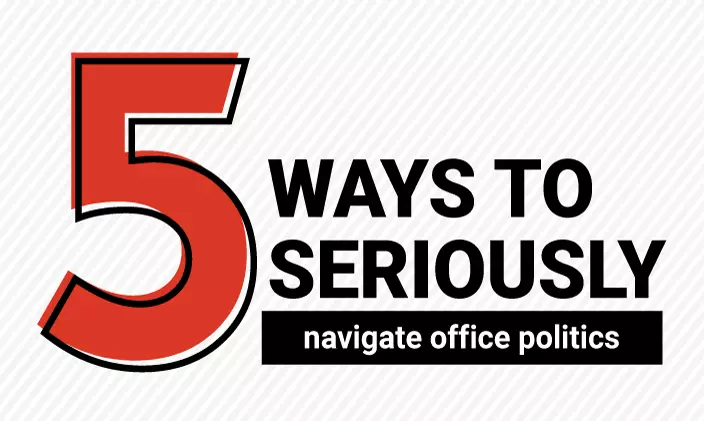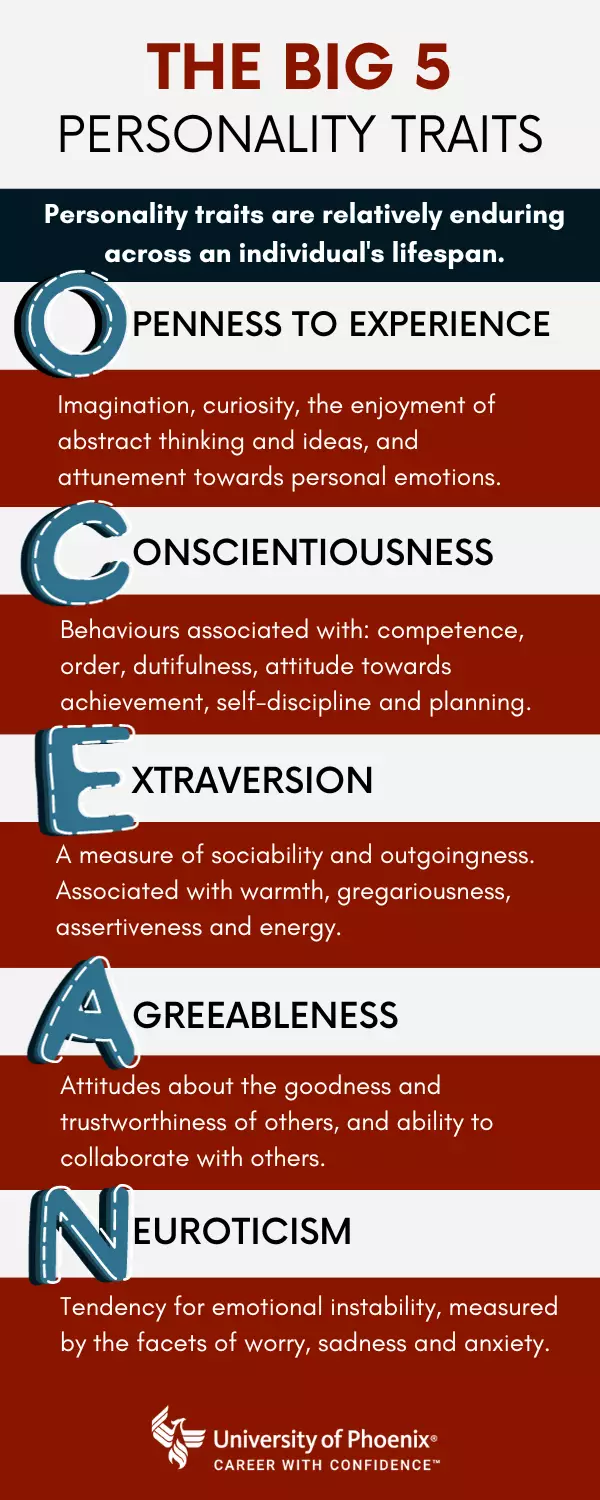This article has been vetted by °ДГЕМмМмІКҝӘҪұјЗВј's editorial advisory committee.Мэ
Read more about our editorial process.

Reviewed by Jessica Roper, MBA,МэDirector of Career Services
At a glance
- The Myers-Briggs Type Indicator is an established tool for identifying 16 innate personality traits.
- While certain personality traits align more easily than others, most office environments benefit from having a variety of personality types.
- Personality assessments and team-building events are two ways to enhance compatibility among differing personality characteristics.
This article was updated on December 4, 2023.
Understanding personality traitsМэ
Trait theory is a popular psychological approach to understanding and measuring human traits to define habitual patterns of behaviors, emotions and thoughts. Personality traits, as they are called, play out and impact every facet of our lives, including our work. Some traits are innate and developed early, while others are learned or developed over a person's life.
Regardless of whether personality traits are natural or learned, they have a resounding influence on how we live and work вҖ” especially with others. Some personality traits work best in certain environments or situations. Some people with certain traits may not mix well with individuals who have a different or conflicting personality type until empathy in understanding the differences develops.Мэ
As employees enter the workforce and move along in their careers, itвҖҷs important they understand their own personality traits so they can be used to determine their career trajectory and even the types of employees to work with. Let's take a deep dive into the types of traits and the role they can play at work.Мэ
Sign up for our LinkedInВ® newsletter to receive career planning tips, resumГ© help and more.Мэ
The big 5 personality traits
As the result of multiple studies and theories on personality traits dating back to 1949, the вҖңBig 5вҖқ personality traits ultimately became the contemporary psychological way of identifying the basic dimensions of understanding a personality. The five traits are extraversion, agreeableness, openness, conscientiousness and neuroticism. An easy way to remember them is the acronym OCEAN, which puts the traits in the order of openness, conscientiousness, extraversion, agreeableness and neuroticism.
Understanding each trait can provide a building block to better understanding someoneвҖҷs own personality or that of a co-worker or boss. HereвҖҷs a closer look at the five key traits.
Openness
This trait refers to people with a broad range of interests who are open to new experiences and opportunities to learn and grow. These individuals are often highly creative. In the workplace, they prefer transparency in their work and direction. They value collaboration and brainstorming. They also prefer consideration rather than adhering to the direction of a main authority with little input.
Conversely, people low in openness often dislike change and donвҖҷt enjoy learning new things or new ideas and may resist unfamiliar or uncomfortable opportunities. Low openness may also lead to difficulty thinking outside the box or being overly imaginative or creative.Мэ
Conscientiousness
Conscientiousness refers to being very thoughtful, diligent and careful. People with this trait may be more organized or seen as more efficient in their life and work because they pay close attention to detail.
In the workplace, conscientious employees may spend the majority of their time planning to ensure they get every detail correct or to their preference and then complete a task quickly. Employees with high conscientiousness prefer having a schedule and detailed tasks and work well in an organized environment.Мэ
Employees low in conscientiousness, on the other hand, dislike structure and organization. They may prefer an вҖңorganized chaosвҖқ approach and can come across as messy or unorganized. They may miss deadlines or details. They also may require less structure to feel comfortable in the workplace, and managers may need to remind them of details and deadlines.Мэ
Extraversion
Extraversion, sometimes spelled вҖңextroversion,вҖқ refers to people who are outgoing and who thrive in social situations. They are often described as high-energy, assertive, talkative and excitable.
Employees with high extraversion work well in large groups or team settings, pulling energy from contact with others. They may speak out in meetings before completely reviewing data or materials and often start or carry a conversation. They may benefit from the opportunity to talk things out and frequently connect with their manager or co-workers.Мэ
The opposite is introversion. Introverted individuals dislike large social groups or situations and may feel drained or exhausted by them. They dislike being the center of attention and may choose to remain quiet. Introverted employees may communicate better through email or instant messenger. They may not speak up in meetings, but that may mean they are taking longer to digest the data or materials and think carefully before sharing thoughts or ideas.Мэ
Agreeableness
People with high agreeableness are often thought of asМэhonest, sympathetic, cooperative and considerate. They may appear to show great interest in the thoughts and feelings of others and demonstrate a high level of sympathy and care for the people around them.
Employees with this trait enjoyМэhelping othersМэand assisting on work-related tasks. They tend toМэwork well with everyoneМэand can be great for joint-team initiatives or within larger collaborations. The downside of this personality is if you need them to give critical feedback; it may be difficult for them to see what needs to be improved upon.
People low on agreeableness often take little interest in others and may appear to not care or even be competitive. Employees with low agreeableness may not work well in larger groups or outside of their direct team as they may be seen as standoffish, aloof, selfish or lacking empathy. They tend to work better on their own.Мэ
Neuroticism
Worry, sadness and anxietyМэoften characterize this trait. People high in neuroticism may haveМэmood swings, be easily upset or be consistently irritable. They may also show signs ofМэenvy, jealousy and frustration.
In the workplace, they may cast their feelings on their work when itвҖҷs difficult or time-consuming or if theyвҖҷre passed over for praise or opportunities.МэManagers can act accordingly to helpМэemployees with high neuroticism feel valued and comfortable when these feelings occur.Мэ
People low on neuroticism typically feel positive, stable and relaxed. They donвҖҷt usually feel stressed and can deal with change or uncomfortable situations well. Such employees may not need as much attention from managers when a situation or assignment is perceived as frustrating or difficult. Managers should understand that people with low neuroticism may seem overly relaxed, but that isnвҖҷt necessarily a warning sign.Мэ
Мэ
Bringing your personality traits to work
Some people like to ask about astrological signs, but when it comes to understanding your approach to work and professional collaboration, asking about work personality traitsМэcan be more effective.
Think about the specific traits that define you. Are you an introverted thinker? An extroverted feeler? And, perhaps more importantly,Мэwhich type do you work best with?
The answer, says °ДГЕМмМмІКҝӘҪұјЗВјМэcareer advisorМэAlice Rush, will likely tie back to theМэ, an assessment that identifies personality traits according to the following four categories:Мэ
- Energy-building (introversion or extraversion)
- Information-gathering (sensing or intuition)
- Decision-making (thinking or feeling)
- Structure (judging or perceiving)
вҖңThe Myers-Briggs Type Indicator [identifies]Мэ16 personality styles, and those absolutely relate to our work styles,вҖқ Rush says.
Know thyself
Rush speaks from experience. She has facilitated team-building exercises at major U.S. corporations and has seen how such self-awareness can enhance collaboration and productivity.
Asked to describe yourself, what would you say? Friendly? Hardworking? Analytical? Creative?
In some ways, the characteristics you choose for yourself are revealing. They point to the qualities you value, and they underscore the role you believe you play in the world.
But to really understand yourМэstrengths, weaknesses and motivations, Rush says thereвҖҷs no substitute for the MBTI. Based on Carl JungвҖҷs hypothesis that everyone isМэborn with set of personality traitsМэthat donвҖҷt really change, this assessment has been repeatedly validated over theМэeight decadesМэsince it was published in 1943.
Each scale of preferences has two options. Everyone aligns, at least the majority of the time, with one of the options in each category for a distinct personality type.
Curious about where you fit in? HereвҖҷs how these traits break down:
Introversion vs. extraversion: How you get energy
- Introverts: Your ideal work environment is quiet, distraction-free and probably solitary.Мэ
- Extraverts: Teamwork, brainstorming, open office setups вҖ” you see these things as a recipe for professional success.
If youвҖҷve ever clashed with a co-worker, it may very well boil down to this difference. вҖңThis actuallyМэcauses a lot of conflictМэin the workplace,вҖқ Rush says. вҖңExtroverts tend to think out loud, and introverts keep their thoughts inside their heads. They complete their thoughts before speaking.
вҖңIntroverts can get very irritated by extroverts. They say, вҖҳWhy canвҖҷt you just think it through on your own and come talk to me once youвҖҷve figured it out?вҖҷ But that canвҖҷt happen with the extrovert, because thatвҖҷs how they figure it out: by talking it out loud.вҖқ
The solution? Rush says everyone has to try a little harder toМэmeet in the middle. Extroverts might work to create more concise emails and presentations, for example, while introverts can mentally prepare for a meeting by recognizing and havingМэcompassionМэfor their co-workersвҖҷ different approach.
Sensing vs. intuition: How you acquire information
Sensing: You love facts, reality and things you can observe, touch, taste and smell. At work, this means you thrive when given clear direction, and you remain focused on the bottom line and details. When you present information, itвҖҷs in a clear, step-by-step manner. You bring workmates with big ideas down to earth and can get into the weeds of a project, seeing the bigger trees through the forest.
Intuitive: You tend to read between the lines and focus on the overall impression of a situation rather than what was explicitly said or done. At work, you probably thrive when given space to innovate and create. You prefer to focus on the possibility of what could be rather than what is and can be drained by details.
Not sure which you are? Imagine your team encounters a new and fairly significant challenge at work. If youвҖҷreМэintuitive, youвҖҷre theМэvisionaryМэin the group who takes a big-picture approach to the solution. You innovate, ideate and lead.
If you gravitate more toward aМэsensoryМэpersonality type, your response will be moreМэpractical. вҖңThose people are more in the weeds,вҖқ Rush explains. вҖңTheyвҖҷll bring the visionary back down to earth [and outline] all the steps itвҖҷs going to take to actually carry out that great idea.вҖқ
These two personality traits, in other words,Мэcomplement each other nicelyМэin the workplace and, together, can lead a team to success.
Thinking vs. feeling: How you make decisions
Thinkers: Do you love a good pros-and-cons list? Do you look for logical explanations and prioritize fairness over feelings, truth over tact? Then youвҖҷre a thinker.
Feelers: Would people describe you as caring and supportive? Do you make decisions with your heart more than your head? Is maintaining emotional harmony within your group more important than being right? Then youвҖҷre a feeler.
It might be tempting to assume that thinkers are more valuable in a work setting than feelers. But imagine your office without that person who can smooth things over when co-workers disagree, or who canМэintuit the next big trendМэeven when the data might suggest otherwise. A happy and productive office needs both types.
Judging vs. perceiving: How you structure your world
Judging: DonвҖҷt worry вҖ” this isnвҖҷt the same thing as being negatively judgmental. Rather, judging personalities tend to be results-oriented, motivated by lists and good at time management. They thrive in structured, orderly environments.
Perceiving: If agility and adaptability are your nouns of choice, and if you thrive with a flexible schedule and keep plans and timelines loose, youвҖҷre a perceiving personality.
Again, theМэadvantagesМэeach personality brings arenвҖҷt always clear. Judging personalities seem tailored to succeed in an office environment, and they do thrive in orderly, structured situations. But when thereвҖҷs aМэchange in directionМэor management, perceivers have their chance to shine. Perceivers prefer to think on their feet and be spontaneous, and donвҖҷt overplan, so they are highly adaptive to change.МэМэ
Know your co-workers
So, which types get along best? вҖңI kind of hate to answer that question, becauseМэyou need all personality styles,вҖқ Rush says.Мэ
True. But you also need to know which relationships mightМэbenefit from a little extra attentionМэand compassion.
With feeling
вҖңIf I were to generalize, feelers are going to tend to get along better with each other typically, because they reallyМэcare about their relationshipsМэmore than anything else,вҖқ Rush observes. The way feelers make decisions is based on relationship harmony, really thinking through how a decision is going to impact people before any facts enter the equation.
But if you need someone to prioritize the companyвҖҷs bottom line and make tough decisions, even when they may negatively impact others, your team better have a thinker close by.
Thinkers meet thinkers
вҖңThe thinking typesМэlove to debate,вҖқ Rush says. вҖңThey can be really fierce. So, they might [argue] and call each other names, and then theyвҖҷre patting themselves on the back and saying, вҖҳLetвҖҷs go have a beer,вҖҷ afterwards.вҖқ
In a private setting, this is all well and good. In an office, however, it might require some deft management.
вҖңReally competitive types have to win and get the last word. Meanwhile, everyone else is quiet,вҖқ Rush says. Managers can intervene by asking people with those personality traits toМэtry being silentМэin the next meeting and just listen to what everyone else has to say.
вҖңThen thereвҖҷs someМэself-awarenessМэthat goes on within the person, and they can recognize, вҖҳI actually got a lot out of that because I wasnвҖҷt talking all the time,вҖҷвҖқ Rush explains.

read similar articles
5 ways to seriously navigate office politics
How to work together
Rush recalls growing up asМэa feeler with logical parents. вҖңIвҖҷd come up with this great idea, and IвҖҷd be so excited, and IвҖҷd share it with them,вҖқ she says. вҖңThey would rip it apart. вҖҰ I would be completely deflated and not even want to continue my research or launch this new idea. They would need to know all the facts gathered before they could approve or disapprove.вҖқ
Now, imagine that dichotomy in an office. Chances are, you can recall more than imagine.
The truth is people come in all sorts of configurations. Rush and her manager line up the same way on three of the four categories. Where do they differ? Rush is an extrovert, and her manager is an introvert.
вҖңWeвҖҷre really different, even though itвҖҷs just that one variable,вҖқ Rush says.
ThatвҖҷs not necessarily a bad thing. Since organizations rely on theМэstrengths each personality type brings to the office, learning how to optimize your work relationships according to personality can be a rewarding use of time and resources. Rush suggests the following:
- Assess your personalities: ThereвҖҷs no substitute for actually taking the MBTI or one of the many offshoots available online. Rush likes the Jung Typology Testв„ў onМэ, andМэМэis often used at companies for the same purpose.
- Read up:МэDo What You Are: Discover the Perfect Career for You Through the Secrets of Personality TypeМэby Paul Tieger, Barbara Barron and Kelly Tieger answers that age-old question, вҖңWhat should I do with my life?вҖқ
- Participate in team-building retreats: If youвҖҷre already in a career you love, get better acquainted with your co-workers through a dedicated team-building event. Sure, the introverts might dread it, but everyone should walk away better because of it.
- Join: Connect with the chapter in your state or city.

ABOUT THE AUTHOR
Elizabeth Exline has been telling stories ever since she won a writing contest in third grade. She's covered design and architecture, travel, lifestyle content and a host of other topics for national, regional, local and brand publications. Additionally, she's worked in content development for Marriott International and manuscript development for a variety of authors.




